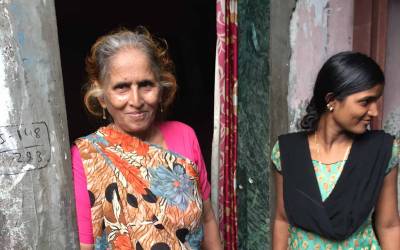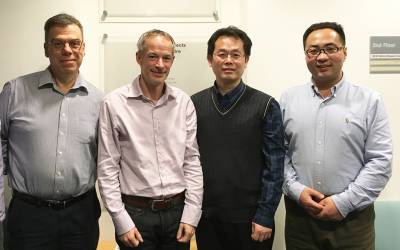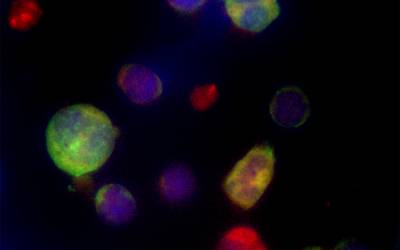UCL is London’s Global University: we aim to work with partners to achieve fair solutions to global challenges.
We recognise that no one institution, no matter how prestigious, can solve these problems alone.
Through our Global Engagement Strategy, we’ve been building and strengthening our international partnerships. We believe that by sharing our expertise and working together, UCL academics, staff, students and their global partners can have the greatest impact.
An example of this is our collaboration with Mexico’s £7.8 million sustainable energy research programme. This initiative is the largest bilateral cooperation with the UK in this field.
We have also developed a transcontinental partnership that will bring together partners from India, Brazil, Turkey, South Africa and Zambia to advance genetic diagnosis and therapy for neuromuscular diseases, which affect at least 17 million children and adults globally.
With Brexit on the horizon, we are consolidating existing partnerships with European universities and launching a new initiative called the Cities partnerships Programme in Rome and Paris, and stepping up our support for EU research collaboration.
The further examples below are a sample of the world-class, creative and interdisciplinary work taking place across UCL, which we are delighted to facilitate and support.
Dame Nicola Brewer, UCL Vice-Provost (International)
Case study: Tackling malnutrition in rural India
An interdisciplinary UCL collaboration is working with global partners to provide community-led solutions to the problem of child malnutrition in rural India.
Professor Monica Lakhanpaul used a Global Engagement Office-led visit to India to make new connections both within, and beyond, UCL. She and Professor Marie Lall (UCL Institute of Education) and Dr Priti Parikh (UCL Engineering) established an initiative with a variety of partners in India to develop new, community-led solutions to the problem of child malnutrition in rural areas.
Their HEEE (Heath Education, Engineering and Environment) platform aims to address development issues in a holistic way, working with local companies, universities and NGOs who have specialist knowledge of local policies and customs. In this way, the team are able to work within communities, translating their research into field activities in order to reach those who will benefit the most.
An initial focus is on infant feeding practices, using local schools as hubs in which to bring people together to raise awareness around nutrition. Professor Lakhanpaul has also used GEO seed funding to make connections with the Mumbai-based Society for Nutrition, Education and Health Action (SNEHA), to help inform her research both in India and the UK.
Image credit: UCL Global Engagement Office
Links:
HEEECase study: Preventing spina bifida
UCL Professors Nick Greene and Andrew Copp have teamed up with colleagues at Peking University (PKU) in a bid to prevent one of the world’s most common birth defects – spina bifida.
Worldwide, neural tube defects (NTDs) such as spina bifida are estimated to affect around one in every 1,000 pregnancies. More than 260,000 babies are born every year with spina bifida, a severely disabling malformation of the spinal cord. Women are advised to supplement their diet with folic acid before and during early pregnancy to reduce the risk of an affected pregnancy. Despite this, some babies still develop the birth defect.
The team, from UCL’s Great Ormond Street Institute of Child Health and Comprehensive Clinical Trials Unit, worked on identifying possible ways to prevent ‘folic acid resistant’ spina bifida. Their initial research suggested that supplementing the diet with inositol (vitamin B8) alongside folic acid was successful at preventing spina bifida. They are now proposing a £5m study of up to 9,000 women in China to confirm their initial findings.
The prevalence of spina bifida in Northern China, where the study will be carried out, is among the highest in the world. China’s systematic collection of data on pregnancy outcomes also means that it will be possible to identify suitable women to take part in the trial.
A bid to fund the clinical trial is currently being considered.
Image credit: UCL Global Engagement Office
Links:
Great Ormond Street Institute of Child Health /
Comprehensive Clinical Trials UnitCase study: Developing research connections in Japan
Professor Claudia Mauri (Vice-Dean International, Medical Sciences) used a Global Engagement Office-led visit to Japan to deepen her faculty’s research collaborations with Osaka University’s world-leading immunology department.
Professor Mauri heads up a team conducting research into rheumatological diseases such as rheumatoid arthritis and lupus. Their focus is on regulatory B cells, a type of white blood cell forming part of the human immune system.
Whilst in Japan, Professor Mauri met with Professor Shimon Sakaguchi, Professor of Immunology and Head of Immunology at Osaka University, who is recognised for his pioneering work on white blood cells. They quickly identified the complementary strengths of the two institutions; UCL has a wealth of patients with a variety of immunological disorders and Osaka’s strength lies in quickly translating findings to the clinic.
Professor Mauri’s visit to Japan was followed by a visit from Professor Sakaguchi to UCL, where he was invited to give a keynote at UCL’s Division of Infection and Immunity’s annual showcase meeting by Professor Hans Stauss. This, in turn, paved the way for the establishment of a mutually beneficial partnership, with an exchange of PhD students and personnel between UCL and Osaka. In this way researchers from both institutions are able to experience new aspects of research in the field of translational immunology.
Image: Regulatory B-cells. Image credit: Diana Matei, PhD, Professor Claudia Mauri’s group
Links:
UCL Infection and Immunity
Further information
 Close
Close




